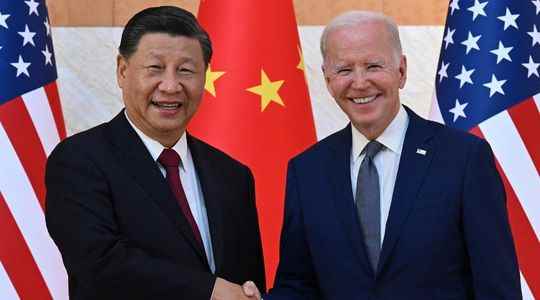It was a first since the arrival of Joe Biden in the White House. The US President and Chinese President Xi Jinping shook hands and exchanged a smile before starting a nearly three-hour face-to-face discussion on Monday, November 14. The objective: to find areas of convergence without avoiding angry subjects, in an attempt to ease tensions before they degenerate into conflict. L’Express takes stock of the important points of this meeting.
- China says “does not want to take the place of the United States”
The exchange took place in a spirit of apparent goodwill on the part of the two rival powers. Xi Jinping tried to reassure his counterpart by assuring him that China had no intention of taking the place of the United States or “changing the existing international order”. He also pointed out that the two countries “share more common subjects than subjects which oppose them”. Words that seem to have borne fruit, since Joe Biden said after the interview that a “new Cold War” was not necessary. Over the past three years, tension between the two countries has escalated as China has grown in power and assertiveness, challenging US leadership and geopolitics since the end of World War II.
- Progress on the question of the Russian invasion
This meeting comes on the eve of the G20, which will take place on Tuesday and Wednesday on the Indonesian island of Bali, where one of the most delicate subjects will be the invasion of Ukraine by Russia. So far, Beijing, a great ally of Russia, refuses to condemn the Russian offensive, even if the international community has called on it many times to try to convince Vladimir Putin to “respect international law”. At the end of this meeting, the White House claimed to have obtained Chinese assurances. They “reiterated their agreement that a nuclear war should never be fought and can never be won”, according to Washington’s account. More vaguely, Beijing said it was “on the side of peace” and again called for negotiations.
Despite these statements on Monday, a joint text on the refusal of a nuclear conflict during the G20 is likely to be blocked by Russian opposition, as well as Beijing’s refusal to deviate from the Russian position or to appear concede ground to Washington.
- Hot discussion around Taiwan
The island ruled separately from the mainland since 1949 but claimed by the communist regime has become a hot topic in recent months, despite being a long-standing sticking point. Last August, Beijing organized gigantic military maneuvers to protest against the trip to this island of the Speaker of the United States House of Representatives, Nancy Pelosi. Breaking with the traditional American ambiguity, Joe Biden then repeated several times that the United States was ready to use force in the event of a Chinese invasion.
To which Xi Jinping replied on Monday that Taiwan is “the first red line not to cross in Sino-American relations”. But the American president assured that he had obtained assurances from Xi Jinping: an invasion is not “imminent”, he assures. “I made it clear that I wanted the trade issues to be resolved peacefully so it never came to that. I’m sure he understood exactly what I was saying, and I understood what he was saying,” he said. to the British media The Guardian.
- Tension continues over North Korea
Joe Biden has sought to push Beijing to use its influence to moderate North Korea, which has just launched a record series of missile launches, appearing to be preparing to conduct the 7th nuclear test in its history. He urged Xi Jinping to encourage North Korea to be “responsible”, and warned that the United States would strengthen its security position in Asia in order to protect its allies in the region, if Beijing could not curb the North Korea’s weapons programs, according to Reuters.
- Timid resumption of climate cooperation
Their cooperation on the climate issue was broken off last summer due to tensions between the two countries around Taiwan. But the world’s two biggest emitters of CO2 have finally announced the resumption of work on “the unprecedented challenges” facing the planet, in Beijing’s words. In a sign of more global detente, US Secretary of State Antony Blinken is expected to visit China early next year, the first such visit since 2018.
